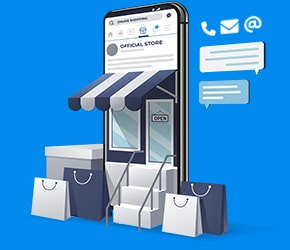Integrating a Custom CRM with E-commerce Platforms

What Is a Custom CRM and How Does It Relate to E-commerce?
At its core, a Customer Relationship Management (CRM) system is a sophisticated tool used to track, manage, and analyze interactions with customers. Think of it as the brain that holds vast amounts of data about customer preferences, behavior, and communications. This information supports sales, marketing, and customer service processes, aiming to enhance customer satisfaction and retention, and ultimately, drive sales growth.
When it comes to selling online, e-commerce platforms are your digital storefronts. They’re crucial for showcasing products, processing orders, and managing inventory. But here’s the catch: while e-commerce platforms excel at transactions, they are often not built for the depth of customer relationship management that a CRM can offer.
Now, let’s toss integration into the mix. When you integrate a custom CRM with an e-commerce platform, you’re creating a supercharged sales ecosystem. This alliance allows seamless sharing of customer information and sales data between the two systems. Why’s that good? You get actionable insights to personalize the customer experience, automate follow-ups, and track the entire customer journey, which can translate into more sales with less effort. Next up, we’ll explore why this fusion is a game-changer for your online business.
Table of contents:
- What Is a Custom CRM and How Does It Relate to E-commerce?
- Why Integrate Your Custom CRM with Your E-commerce Platform?
- How Does CRM Integration Enhance Customer Experience?
- What Are the Key Features to Look for in a CRM for E-commerce Integration?
- How to Overcome Challenges in CRM and E-commerce Platform Integration?
- What Are Some Best Practices for Seamless Integration?
- Who Can Help You Integrate Your Custom CRM with Your E-commerce Platform?
Why Integrate Your Custom CRM with Your E-commerce Platform?
Integrating a custom Customer Relationship Management (CRM) system with your e-commerce platform is like upgrading your shop with a high-tech assistant. It’s essential for keeping your customer data well-oiled and accessible. Ever lost track of a customer’s buying history or preferences? An integrated CRM solves that. It stores all that vital information, making it easier to personalize experiences and show your customers that you know them better than their favorite barista does.
Streamlining becomes your new buzzword once you sync your CRM with your e-commerce operations. It’s like putting the sales process, inventory management, and customer service into a single, well-organized filing cabinet, so that every aspect of your sales channel hums along seamlessly. This integration means fewer errors, quicker response times, and a smoother run from cart to delivery, which not only makes your life easier but also delights your customers.
Now, let’s talk success metrics: sales and customer loyalty. Who doesn’t want their cash registers ringing more often? An integrated CRM can become your silent salesman, promoting smarter, targeted campaigns that drive sales. Moreover, it keeps customers coming back for more by nurturing those relationships post-purchase. Picture low churn rates and a customer base that evangelizes your brand. By bringing your CRM into the heart of your e-commerce strategy, you’re setting up for a win-win in sales growth and lasting customer bonds.
How Does CRM Integration Enhance Customer Experience?
Diving straight in, custom CRM integration is all about tailoring the shopping journey. By leveraging a customer’s buying history, businesses can create personalized interactions—from product recommendations to bespoke email campaigns. This isn’t just nice to have; it’s expected by consumers who want to feel understood and valued.
Now, let’s talk about response times. Nobody likes to wait, and that includes your customers. Integrating a CRM with e-commerce means you can have automated response systems in place. From instant chat replies to timely email follow-ups, efficiency is key. Improvements in customer service become evident: queries are resolved faster, satisfaction rates soar, and service becomes streamlined.
But wait, there’s more – no crystal ball needed here. With CRM integration, businesses unlock the power of predictive analysis. It’s not just about looking back but also predicting future trends. What does this mean for you? Targeted marketing becomes a breeze, you can tailor sales strategies and stock inventory accordingly, all because you’re informed about what customers might want next before they even know it themselves.
What Are the Key Features to Look for in a CRM for E-commerce Integration?
When hunting for a CRM fit to bolster your e-commerce endeavors, zero in on features that enhance customer interaction and sales operations. Specifically, you’ll want a system that makes capturing, monitoring, and managing customer data a breeze. Think: seamless tracking of customer activities from first click to latest purchase. This streamlining is pivotal for personalizing marketing efforts and amplifying conversion rates.
Next, scalability shouldn’t just be a buzzword—it’s essential. Your CRM should grow with your business, adapting to increased sales volume or expanding product lines without hiccuping. Customization options matter too. Each e-commerce business is unique, so a one-size-fits-all CRM solution won’t cut it. Look for software that lets you plug in the functionality you need, whether that’s specific sales pipelines, email marketing integration, or loyalty program management.
Finally, dive into data analysis and reporting tools. With the right CRM, data transforms into actionable insights. Comprehensive reporting capabilities empower you to make informed decisions faster, track KPIs, and measure up against sales targets. It’s these insights that fine-tune your sales strategy, leading to more carts checked out and fewer abandoned. Choose a CRM that gives you the power to dissect data like a pro, providing a sharper picture of your business performance.
How to Overcome Challenges in CRM and E-commerce Platform Integration?
Integrating a custom Customer Relationship Management (CRM) system with an e-commerce platform can feel like fitting puzzle pieces from different sets together. The common challenges? Compatibility issues. Like when your CRM speaks French but your e-commerce platform only understands English. First step: speak the same language. That’s about APIs and ensuring they communicate effectively, allowing for seamless data exchange.
Now, let’s talk about moving data—your customer data, product information, and sales records. Data migration isn’t just copy-paste. It’s the strategic syncing of databases. This means setting up an automated process to ensure data flows two-ways without duplication or loss. Think of it like a meticulous DJ synchronizing beats, keeping the rhythm of your business flowing without missing a beat.
But what about your customer’s secret formula or credit card details? Data security and privacy are paramount during integration. Follow the best practices: encrypt data, use secure protocols, and comply with regulations like GDPR. Triple-lock your data, keeping it away from prying eyes. It’s about creating a vault as secure as Fort Knox for your precious data while it ropes-dances between systems.
What Are Some Best Practices for Seamless Integration?
For a successful marriage between your custom Customer Relationship Management (CRM) and e-commerce platforms, picking the right integration tools and service providers is crucial. Comprehensive connectors that promise secure data transfer should top your list. Ensure your provider has a proven track record; look for testimonials, case studies, and the breadth of their integration library. The quality and reliability of the integration can make or break your sales, so choose wisely.
Next, the establishment of a clear integration roadmap and timeline is essential for a smooth transition. Know your milestones: from syncing customer data to product information and order history, a well-defined plan will keep everyone focused and on schedule. This roadmap should detail every step, anticipated outcomes, and allocate buffer times for unforeseen delays, ensuring all team members stay on the same page.
Lastly, underestimating the need for training and support for your staff to adapt to the new integrated system is a common pitfall. An intuitive interface is a start, but tailored training sessions that address day-to-day operations can catapult your team’s efficiency. Continuous support post-integration is just as critical; it ensures any hiccups are dealt with promptly, minimizing potential disruptions.
- Analyzing and selecting integration tools or services? Check their compatibility with your current systems and future scalability.
- Developing your integration roadmap? Prioritize tasks and establish accountability at each phase.
- Implementing training and support programs? Periodic reviews will help tweak these initiatives to better suit the evolving needs of your team.
Who Can Help You Integrate Your Custom CRM with Your E-commerce Platform?
Integrating a custom CRM with your e-commerce platform is like performing a well-choreographed dance – it requires precision, expertise, and sometimes a helping hand. Software developers and IT specialists are your lead dancers. With their deep understanding of both your CRM’s architecture and the e-commerce system’s API, they can ensure the data flows smoothly between the two platforms. Think streamlined order processing, real-time inventory updates, and personalized customer service. They’re essential for customizing the integration to fit your business like a glove.
Now, what about the experts? Partnering with CRM and e-commerce platform mavens elevates your integration from functional to formidable. These pros know their platforms inside out, down to the most arcane feature. By bringing them on board, you’re not just syncing your systems; you’re optimizing them. Expect guidance on best practices, recommendations on features you didn’t even know you needed, and troubleshooting that gets you back on track fast. Their insight can be invaluable, transforming your integrated system into a competitive edge.
But let’s say coding and platform intricacies aren’t your jam; that’s where third-party integration services and middleware solutions shine. Think of them as the choreographers who handle the heavy lifting, providing pre-built connectors and user-friendly dashboards that make integration achievable without an army of developers. Solutions like Zapier, Jitterbit, or MuleSoft act as the translators and bridges between your CRM and e-commerce systems, smoothing out complex integration processes. They enable a quick setup and maintenance, often with drag-and-drop interfaces that mean you spend less time fiddling with APIs and more time growing your business.
In conclusion, whether it’s the technical prowess of developers, the strategic direction of platform experts, or the accessible paths forged by third-party services, you have allies ready to assist in melding your custom CRM development with your e-commerce platform. Each brings unique advantages to the table, but ultimately, the goal is the same: a seamless integration that empowers your business operations and enhances customer experiences.

